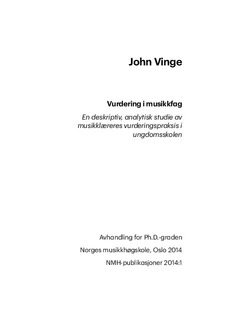| dc.description.abstract | Abstract - English:
In Norway, as in the rest of the Scandinavian countries, we have experienced an increased emphasis on student assessment in all levels of schooling since the beginning of the 21th century. International educational research influences national educational and political discourses, and new assessment procedures, principles and techniques are being implemented in all school subjects, including music. Yet, assessment in music is traditional seen as a difficult endeavour, in many cases also as something incompatible with the fun and joyful aspects of engaging with music. Furthermore, assessment in music education has received little attention in Nordic literature of and research into music didactics. As a result, there is little research‐based knowledge about the kinds of assessment practices and strategies in use; how the teachers experience them; and how the enhanced focus on assessment, in all its forms and shapes, influences the subject’s content and teaching methods.
This presentation will cover the main aspects and findings of a Ph.D. research project carried out in the period 2009-‐2013. The research aimed to describe and understand assessment practices within the compulsory subject of music in lower secondary schools in Norway (age 13-‐16). In this project the concept of assessment was investigated explorative and in a broad context, covering both formative and summative assessment, and also the relationship between these two concepts. The empirical data were collected from in-‐depth interviews and document analyses of 14 music teachers, all working within the same school district in the eastern part of Norway and representing different educational backgrounds and work experiences. Using theoretical insights from general assessment theory (Sadler; Eisner, Black & Wiliam; Hattie), didactical theory (Heimann, Schulz & Otto; Lundgren; Jank & Meyer) and practice theory (Bourdieu), the analysis has pursued to answer the following research questions:
• How is assessment carried out within the compulsory subject of music in lower secondary school?
• What are the teachers’ attitudes towards, and main challenges of assessment?
• What seems to be the central factors regulating and constraining the assessment practices?
• How do various assessment regulations influence the music teachers’ choices of musical content and learning activities?
The main findings from the research suggest that there has been a clear tendency of moving towards systematic criterion based assessment practices in Norway since the implementation of the latest curriculum reform (LK06, The Knowledge Reform). The teachers welcome, and put to use, new assessment principles and techniques for enhancing student learning, the so-‐called assessment for learning concept. Still, the analysis indicates that these principles and techniques become most relevant when they are used in grading procedures – assessment of learning. The teachers report challenges regarding the formulation of adequate assessment criteria for the different learning activities and to communicate these to the students. But having done this, the teachers find the enhanced use of rubrics and quality descriptors as empowering in the summative manner. The main challenge for music teachers has always been to address assessment in a transparent, objective manner and to include all aspects of musical learning (e.g. the aesthetic, creative, emotional, musical) in the assessment practice. The findings of the current study suggest that different kinds of ideological, economic and juridical structures surrounding the music subject, in combination with the teachers’ musical and pedagogical competencies, constitute the construction of different kinds of didactical self defence strategies used by the teachers to negation between the students, the subject and their own needs and intentions. - * - * - * - * -
Sammendrag:
Elevvurdering har fått økt internasjonalt fokus på 2000-tallet og preger nå norsk skole på mange måter. Nye ideer, prinsipper og verktøy for vurdering tas i bruk i samtlige skolefag, inkludert musikkfaget. John Vinge redegjør i denne avhandlingen for hvordan 14 lærere i ungdomsskolen praktiserer, begrunner og opplever elevvurdering i sine musikkfag. Han beskriver hvordan ulike vurderingsutfordringer skapes i relasjonene mellom strukturer rundt musikkfaget og strukturer innvevd i de musikkfaglige læringsaktivitetene som utøves i klasserommet. Vurdering i musikkfaget i skolen er tradisjonelt forbundet med mange utfordringer. Faget har et bredt kunnskapsgrunnlag med både kunstneriske, håndverksmessige og vitenskapelige dimensjoner. Undervisningen søker å kultivere elevenes kunnskaper, ferdigheter og holdninger gjennom praktiske, skapende og teoretiske aktiviteter. Hvilke vurderingsformer brukes for å måle elevenes læring i et slikt fag? Hvordan klarer læreren å gi individuelle tilbakemeldinger i et fag med få timer, mange elever og flere klasser? Hvordan takler musikklæreren krav til likebehandling av elevene i et fag preget av mangfold i instrumenter og musikerroller? Hvordan begrunner læreren elevvurderinger i skapende aktiviteter hvis målet er å stimulere elevenes kreativitet? Og hvordan kan den enkelte musikklærer på den enkelte skole være sikker på at han eller hun ikke stiller for strenge eller for milde krav? Vinge beskriver hvordan lærerne forholder seg til slike utfordringer og hvilke løsninger de velger. Gjennom ulike strategier forhandler lærerne mellom elevenes, fagets og sine egne behov og intensjoner. Avhandlingens resultater tyder på at et økt generelt fokus på vurdering i skolen preger skolens musikkfag og på ulike måter regulerer lærernes valg av innhold og aktivitetsformer. Avhandlingen gir viktige bidrag til forståelsen av et sentralt problemfelt i musikkfaglig praksis som er lite undersøkt i musikkpedagogisk forskning. | nb_NO |
